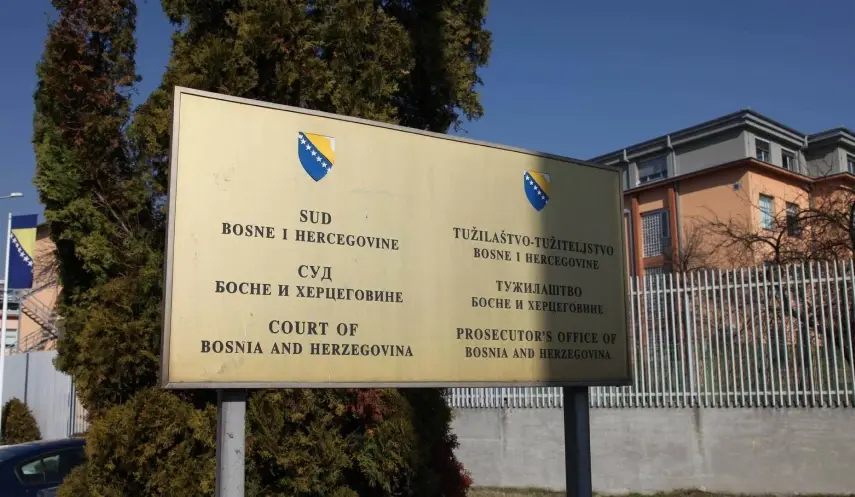FOUND HIS SISTER AND BROTHER-IN-LAW AMONG DEAD
BiH - Court - war crime
10/07/2025
18:07

SARAJEVO, OCTOBER 7 /SRNA/ – Prosecution witnesses at the trial of members of the so-called BiH Army for crimes committed against Serbs in the Višegrad, Foča and Čajniče areas testified today that they recognized their loved ones among the victims from Jošanica, whose mutilated bodies bore stab wounds when they were brought to Foča.
Witness Slavko Đorđević said he was in charge of receiving the bodies of those killed in Jošanica and that among the dead he found his sister Jela and brother-in-law Miladin Višnjić.
“When I lined up the victims, I saw my sister and brother-in-law. I was so shocked I couldn’t even cry. I’ve had diabetes ever since,” Đorđević said.
He added that upon examining his sister’s body, he saw a large wound on her neck — the cause of death — as well as several stab wounds to her abdomen, while his brother-in-law had a pierced neck and leg.
Đorđević said that Vasika Mićević, who witnessed the Jošanica massacre, told him that a Muslim man recognized Jela Višnjić as his sister and stabbed her several times in the stomach because of it.
He recalled that on December 19, 1992, he was working as a technician in the surgical ward of Foča Hospital when, around noon, they were informed that a massacre had taken place in Jošanica and that the bodies would be brought in by truck.
“They started bringing them around 1:00 p.m. My task was to clean the wounds and faces so the families could identify them,” Đorđević said.
He testified that all the victims were wearing civilian clothes and were dressed nicely because it had been a Patron Saint's day.
When he saw the extent of the mutilations, he called photographer Ivanović from Foča to document everything. “I helped him. I lifted little Danica’s head so she could be photographed,” Đorđević said.
According to him, no autopsies were performed because the injuries were visible to the naked eye — it was only necessary to describe them.
He noted that several doctors and technicians working at Foča Hospital were Muslims, and that together with their Serb colleagues, they had moved their families into the hospital for safety.
Prosecution witness Slaviša Mićević testified that his father, who had been a military cook in the village of Gapić, was killed near the house of his uncle, where he had gone to celebrate the Patron Saint's day.
“Dušanka Višnjić Lalović told me that Muslims killed my father, her father Rade Višnjić, and several others,” Mićević said, adding that she had witnessed the killings.
Mićević confirmed that he saw his father’s body in the morgue, wearing black trousers and a white shirt soaked in blood.
“He had two gunshot wounds to the abdomen and a 15-centimeter cut on his neck,” Mićević said, adding that he did not allow an autopsy to be performed.
He also stated that he had obtained a DVD showing that around 5:00 p.m. on December 19, 1992, Muslim forces were retreating from Jošanica toward Goražde, and that he recognized Kemo Bradarić, a history teacher from the Foča Secondary School Center, in the footage.
Mićević said he handed the recording over to the inspector.
When the defense of the second defendant asked if he was aware that his father had been killed while retreating from the village of Gapić toward Medanovići, he replied that his father had been killed 30 meters from the house where the feast was being served.
Former members of the so-called BiH Army — Ferid Buljubašić, Ahmet Sejdić, Rašid Sobo, Ševko Glušac, Zakir Jamak, Bahrudin Muhić, Adem Fehrić, Mustafa Poljo, Enver Kustura, Muhamed Liska, Sakib Čakar, Izet Sejdić, and Munir Nalo — are charged with crimes against Serbs in the Višegrad, Foča, and Čajniče areas.
The indictment covers crimes committed in the municipalities of Foča, Višegrad, and Čajniče between August 1992 and February 1993.
The trial is scheduled to resume on October 14.
Tags

SERBS IN TEARS AND FEAR OVER OWNERSHIP OF ORTHODOX CEMETERIES AND CHURCHES

CVIJANOVIĆ DEMANDS ACCOUNTABILITY FOR SHAMEFUL CONCERT IN ŠIROKI BRIJEG

OSTOJIĆ URGES BiH AND EU TO ACT OVER GLORIFICATION OF FASCIST IDEOLOGIES





